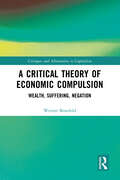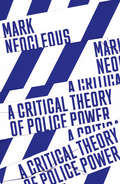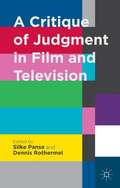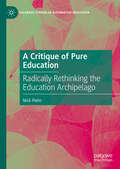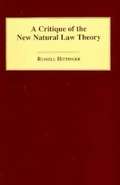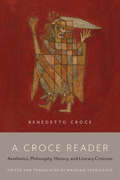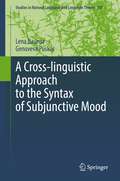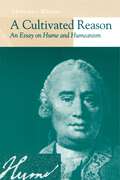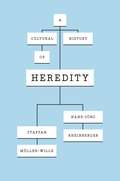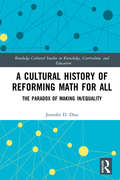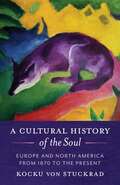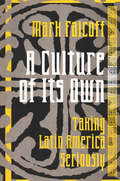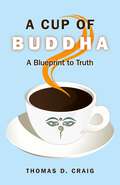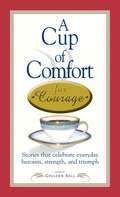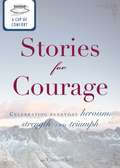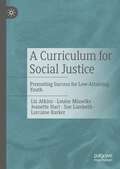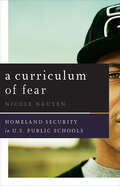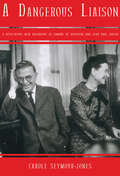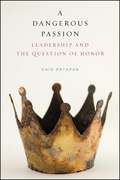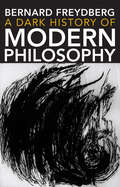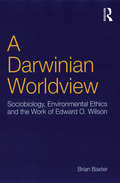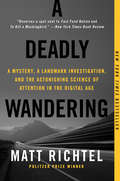- Table View
- List View
A Critical Theory of Economic Compulsion: Wealth, Suffering, Negation (Critiques and Alternatives to Capitalism)
by Werner BonefeldThis book explores a variety of interconnected themes central to contemporary Marxist theory and its further development as a critical social theory. Championing the critique of political economy as a critical theory of society and rejecting Marxian economics as a contradiction in terms, it argues instead that economic categories are perverted social categories, before identifying the sheer unrest of life - the struggle to make ends meet - as the negative content of the reified system of economic objectivity. With class struggle recognised as the negative category of the cold society of capitalist wealth, which sees in humanity a living resource for economic progress, the author contends that the critique of class society finds its rational solution in the society of human purposes, that is, the classless society of communist individuals. A theoretically sophisticated engagement with Marxist thought, A Critical Theory of Economic Compulsion will appeal to scholars of social and political theory with interests in critical theory and post-capitalist imaginaries.
A Critical Theory of Police Power: The Fabrication of the Social Order
by Mark NeocleousPutting police power into the centre of the picture of capitalismThe ubiquitous nature and political attraction of the concept of order has to be understood in conjunction with the idea of police. Since its first publication, this book has been one of the most powerful and wide-ranging critiques of the police power. Neocleous argues for an expanded concept of police, able to account for the range of institutions through which policing takes place. These institutions are concerned not just with the maintenance and reproduction of order, but with its very fabrication, especially the fabrication of a social order founded on wage labour. By situating the police power in relation to both capital and the state and at the heart of the politics of security, the book opens up into an understanding of the ways in which the state administers civil society and fabricates order through law and the ideology of crime. The discretionary violence of the police on the street is thereby connected to the wider administrative powers of the state, and the thud of the truncheon to the dull compulsion of economic relations.
A Critique of Judgment in Film and Television
by Silke Panse Dennis RothermelA Critique of Judgment in Film and Television is a response to a significant increase of judgment and judgmentalism in contemporary television, film, and social media by investigating the changing relations between the aesthetics and ethics of judgment.
A Critique of Pure Education: Radically Rethinking the Education Archipelago (Palgrave Studies in Alternative Education)
by Nick PeimThis book analyses educational theory in order to offer an alternative view of the history of education in modernity. It provides a new understanding of education as a phenomenon that draws on powerful lines of thinking, but also makes a significant departure from the conventional wisdom of both education policy and education studies. These perspectives offer an original and challenging account of what education is and of what politics has become, providing resources to rethink education as a fundamental dimension of the unprecedented political order of our time. It does this through a focus on what it takes to be the key, complex and expanding political apparatus of education. Taking the school to be the paradigm institution of modernity and beyond, the book proposes that we see the school as central to contemporary political ontology.
A Critique of the New Natural Law Theory (Revisions: Vol 7)
by Russell HittingerIn this book, Hittinger seeks to provide a critique of the "new natural law theory" developed over the past two decades by Germain G. Grisez and, to a lesser degree, by John M. Finnis. Grisez's articulation of the position began in the early 1960s with the publication of his Contraception and the Natural Law, continued with the publication of major articles and massive books concerned with abortion, euthanasia and other issues, and , while still developing today, culminated in the 1983 publication of his Christian Moral PrinCiples. the first of a projected four-volume work in moral theology. In Christian Moral Principles.
A Croce Reader: Aesthetics, Philosophy, History, and Literary Criticism
by Massimo VerdicchioBenedetto Croce was a historian, humanist, political figure, and the foremost Italian philosopher of the early twentieth-century. A Croce Reader brings together the author’s most important works across the fields of aesthetics, philosophy, history, literary criticism, and the Baroque and presents the “other” Croce that has been erased by scholarly tradition, including by Croce himself. Massimo Verdicchio traces the progress of Croce as a thinker, focusing on his philosophy of absolute historicism and its aesthetic implications. Unlike other anthologies, A Croce Reader includes essays from the Aesthetics of 1902 and key studies on Vico, Hegel, and Pirandello. Verdicchio’s masterful translation of the source material welcomes specialists and non-specialists alike to discover the “other” Croce for themselves.
A Cross-linguistic Approach to the Syntax of Subjunctive Mood (Studies in Natural Language and Linguistic Theory #101)
by Lena Baunaz Genoveva PuskásThis monograph gives a unified account of the syntactic distribution of subjunctive mood across languages, including Romance, Balkan (South Slavic and Modern Greek), and Hungarian, among others. Starting from a close scrutiny of the environments in which subjunctive mood occurs and of its semantic contribution, we present a feature-based approach which reveals the common properties of the class of verbs which embed subjunctive, and which takes into account the variation in subjunctive-related complementizers. Two main proposals can be highlighted: (i) the lexical semantics of the main clause predicate plays a crucial role in mood selection. More specifically subjunctive mood is regulated by a specific property of the main predicate, the emotive property, which is associated with the external argument of the embedding verb (usually the Subject). The book proposes a nanosyntactic analysis of the internal structure of embedding verbs. (ii) Cross- and intra-linguistic variations are dealt with according to different patterns of lexicalization, i.e., variations depend on what portions of the verb’s and complementizer’s functional sequence is lexicalized and on how it is packaged by languages. In doing so, this approach provides a uniform account of the phenomenon of embedded subjunctives. The monograph takes a novel, feature-based approach to the question of subjunctive licensing, providing a detailed analysis of the features of the matrix verb, of the complementizer and of the embedded subjunctive clause. It is also based on a wide empirical coverage, ranging from the relatively well-studied groups of Romance and Balkan languages to less explored languages from non-Indo-European families (Hungarian).
A Cultivated Reason: An Essay on Hume and Humeanism (G - Reference, Information and Interdisciplinary Subjects)
by Christopher WilliamsAs Plato’s tripartite division of the soul, Descartes’s criterion of clear and distinct ideas, and Kant’s notion of the categorical imperative attest, philosophy has traditionally been wedded to rationalism and its “intellectualist” view of persons. In this book Christopher Williams seeks to wean his fellow philosophers away from an overly rationalistic self-understanding by using resources that are available within the philosophical tradition itself, including some that anticipate strands of Nietzsche’s thought.The book begins by developing Hume’s critique of rationalism, with reference especially to the section of the Treatise that deals with the continuing existence of bodies (an argument that subverts intellectualist criteria by attempting to satisfy them) and to his neglected essay “The Sceptic” where Hume reveals the importance of our embodiment through a comic portrayal of philosophers’ efforts to “correct our sentiments.” Then it moves on to ward off charges of irrationalism by showing that, although our powers of self-correction are more limited than the rationalist thinks they are, a Humean position is able both to sustain a commitment to reflection and to sensitize us to a version of irrationalism, manifest in monotheistic theologies, that is otherwise difficult to detect. The book concludes, more speculatively, with a comparison of persons to artworks in order to show how our aesthetic dimension is the source of some of the normative work previously assigned to rationalist reason.Ranging as it does across subfields from epistemology and history of philosophy to ethics and aesthetics, A Cultivated Reason should appeal to a wide audience of philosophers and to scholars in other fields as well.
A Cultural History of Heredity
by Hans-Jörg Rheinberger Staffan Müller-Wille&“Thought-provoking…any scientist interested in genetics will find this an enlightening look at the history of this field.&”—Quarterly Review of Biology It was only around 1800 that heredity began to enter debates among physicians, breeders, and naturalists. Soon thereafter, it evolved into one of the most fundamental concepts of biology. Here, Staffan Muller-Wille and Hans-Jorg Rheinberger offer a succinct cultural history of the scientific concept of heredity. They outline the dramatic changes the idea has undergone since the early modern period and describe the political and technological developments that brought about these changes. They begin with an account of premodern theories of generation, showing that these were concerned with the procreation of individuals rather than with hereditary transmission, and reveal that when hereditarian thinking first emerged, it did so in a variety of cultural domains, such as politics and law, medicine, natural history, breeding, and anthropology. The authors then track theories of heredity from the late nineteenth century—when leading biologists considered it in light of growing societal concerns with race and eugenics—through the rise of classical and molecular genetics in the twentieth century, to today, as researchers apply sophisticated information technologies to understand heredity. What we come to see from this exquisite history is why it took such a long time for heredity to become a prominent concept in the life sciences, and why it gained such overwhelming importance in those sciences and the broader culture over the last two centuries.
A Cultural History of Reforming Math for All: The Paradox of Making In/equality (Routledge Cultural Studies in Knowledge, Curriculum, and Education)
by Jennifer D. DiazWhile many accept that math is a universal, culturally indifferent subject in school, this book demonstrates that this is anything but true. Building off of a historically conscious understanding of school reform, Diaz makes the case that the language of mathematics, and the symbols through which it is communicated, is not merely about the alleged cultural indifference of mathematical thinking; rather, mathematical teaching relates to historical, cultural, political, and social understandings of equality that order who the child is and should be. Focusing on elementary math for all education reforms in America since the mid-twentieth century, Diaz offers an alternative way of thinking about the subject that recognizes the historical making of contemporary notions of inequality and difference.
A Cultural History of the Soul: Europe and North America from 1870 to the Present
by Kocku von StuckradThe soul, which dominated many intellectual debates at the beginning of the twentieth century, has virtually disappeared from the sciences and the humanities. Yet it is everywhere in popular culture—from holistic therapies and new spiritual practices to literature and film to ecological and political ideologies. Ignored by scholars, it is hiding in plain sight in a plethora of religious, psychological, environmental, and scientific movements.This book uncovers the history of the concept of the soul in twentieth-century Europe and North America. Beginning in fin de siècle Germany, Kocku von Stuckrad examines a fascination spanning philosophy, the sciences, the arts, and the study of religion, as well as occultism and spiritualism, against the backdrop of the emergence of experimental psychology. He then explores how and why the United States witnessed a flowering of ideas about the soul in popular culture and spirituality in the latter half of the century.Von Stuckrad examines an astonishingly wide range of figures and movements—ranging from Ernest Renan, Martin Buber, and Carl Gustav Jung to the Esalen Institute, deep ecology, and revivals of shamanism, animism, and paganism to Rachel Carson, Ursula K. Le Guin, and the Harry Potter franchise. Revealing how the soul remains central to a culture that is only seemingly secular, this book casts new light on the place of spirituality, religion, and metaphysics in Europe and North America today.
A Culture of Its Own: Taking Latin America Seriously
by Mark FalcoffA Culture of Its Own: Taking Latin America Seriously presents Mark Falcoff's essays on the region. Many of them are contentious; none of them are dull. He ranges from bilingualism to the cult of Garcia Lorca, from U.S.-Cuban relations to Chile's curious love affair with Germany. On more than one occasion, Falcoff takes aim at American journalism and scholarship, both of which, he argues, have all too often produced a fantasy version of Latin America which reflects our own national narcissism rather than genuine curiosity about the other. Latin America, Falcoff argues, is not merely a geographical extension of the United States, or a kind of downmarket version of the American Southwest. It is a culture all its own, with its own historical memory, sensibility, and worldview. Its achievements -and its miseries-are also its own, not the end-product of policies made by the Pentagon, Wall Street, or the CIA.Falcoff writes about the region with originality, iconoclastic wit, and distinctive literary flair. His volume will interest Latin American specialists, diplomats, and journalists as well as those general readers who think they are not interested in Latin America-or who only suspect they might be, but don't know quite where to start.
A Cup of Buddha
by Thomas D. CraigA Cup of Buddha: reflections on truth discusses how to take the journey toward inner peace, toward truth in entertaining, simple language beyond the abstract and mystical concepts typically found in eastern philosophy books. The book applies eastern philosophy to western living utilizing pop culture and music metaphors to explore dense topics in an easy to digest format. Individuals are restless, and unhappy. We search for the water to put out our fire of discontent filling this space with self help books, food, new cars, relationships, and more, all with short term satisfaction but our fire still burns. We look outward, we look to others, yet the fire rages. A Cup of Buddha: reflections on truth addresses this fire within each of us, exploring the actual journey toward truth, understanding that each moment in life is everything, and we alone ultimately make this choice toward happiness.
A Cup of Comfort Courage
by Colleen SellTo avid fans around the world, A Cup of Comfort has gained recognition as the #1 series for providing a pick-me-up when readers need it most-as well as for remarkable stories that turn the ordinary into the extraordinary. A Cup of Comfort for Courage is the boldest volume yet, celebrating heroines and heroes who transformed the lives of everyone who knows them. This remarkable collection tells of more than fifty advocates, hard workers, and small-town stars, such as: A young immigrant who follows the ancient advice to "go west"--and creates her own American dream A high school football hero who braves a strong current to save more than a dozen lives when a catastrophic flood washes away a school bus A young woman who escapes war-torn Bosnia with nothing but the clothes on her back and her daughter in her arms A young woman who survives a near-fatal car accident and not only regains her mobility, but summons the strength to hike the 2,100-mile Appalachian Trail A coal miner who holds back the flow of oncoming water in a tunnel--just long enough for his comrades to escape certain death! The stories in A Cup of Comfort for Courage will kindle the spirit of its readers and offer hope whenever they need it. It's nothing less than a supportive friend and a powerful mentor in times of struggle-and triumph.
A Cup of Comfort Courage: Stories That Celebrate Everyday Heroism, Strength, and Triumph
by Colleen SellTo avid fans around the world, A Cup of Comfort has gained recognition as the #1 series for providing a pick-me-up when readers need it most-as well as for remarkable stories that turn the ordinary into the extraordinary. A Cup of Comfort for Courage is the boldest volume yet, celebrating heroines and heroes who transformed the lives of everyone who knows them.This remarkable collection tells of more than fifty advocates, hard workers, and small-town stars, such as:A young immigrant who follows the ancient advice to "go west"—and creates her own American dreamA high school football hero who braves a strong current to save more than a dozen lives when a catastrophic flood washes away a school busA young woman who escapes war-torn Bosnia with nothing but the clothes on her back and her daughter in her armsA young woman who survives a near-fatal car accident and not only regains her mobility, but summons the strength to hike the 2,100-mile Appalachian TrailA coal miner who holds back the flow of oncoming water in a tunnel—just long enough for his comrades to escape certain death!The stories in A Cup of Comfort for Courage will kindle the spirit of its readers and offer hope whenever they need it. It’s nothing less than a supportive friend and a powerful mentor in times of struggle-and triumph.
A Cup of Comfort Stories for Courage
by Colleen SellIn A Cup of Comfort Stories for Courage, you'll find the heroines and heroes who have transformed the lives of everyone who knows them. These three stories will kindle your spirit and offer you hope whenever you need it. It's nothing less than a supporting friend a powerful mentor in times of struggle--and triumph.
A Cup of Comfort Stories for Courage: Celebrating everyday heroism, strength, and triumph
by Colleen SellIn A Cup of Comfort Stories for Courage, you’ll find the heroines and heroes who have transformed the lives of everyone who knows them. These three stories will kindle your spirit and offer you hope whenever you need it. It’s nothing less than a supporting friend a powerful mentor in times of struggle - and triumph.
A Curriculum for Social Justice: Promoting Success for Low-Attaining Youth
by Liz Atkins Louise Misselke Jeanette Hart Sue Lambeth Lorraine BarkerThis book reports the outcomes of a research project which involved developing and implementing a research-informed curriculum for low-attaining further education students. Key aims of the curriculum were to ameliorate some of the social and educational disadvantages faced by the students, and to support secure and sustainable transitions to employment or further education. The book begins by outlining the characteristics of the lowest-attaining young people and considering the challenges they face. Subsequent chapters describe the educational and geographic contexts, the curriculum, and the pedagogical approaches adopted. It moves on to describe the outcomes of the project, drawing on narratives of individual students and staff to illustrate the benefits of a broader curriculum which acknowledges earlier disadvantage. The book concludes with a discussion of how the curriculum could be adapted in different contexts and considers the implications of such change in terms of policy, practice, future research and social justice.
A Curriculum of Fear: Homeland Security in U.S. Public Schools
by Nicole NguyenWelcome to Milton High School, where fear is a teacher&’s best tool and every student is a soldier in the war on terror. A struggling public school outside the nation&’s capital, Milton sat squarely at the center of two trends: growing fear of resurgent terrorism and mounting pressure to run schools as job training sites. In response, the school established a specialized Homeland Security program. A Curriculum of Fear takes us into Milton for a day-to-day look at how such a program works, what it means to students and staff, and what it says about the militarization of U.S. public schools and, more broadly, the state of public education in this country. Nicole Nguyen guides us through a curriculum of national security–themed classes, electives, and internships designed through public-private partnerships with major defense contractors like Northrop Grumman and federal agencies like the NSA. She introduces us to students in the process of becoming a corps of &“diverse workers&” for the national security industry, learning to be &“vigilant&” citizens; and she shows us the everyday realities of a program intended to improve the school, revitalize the community, and eliminate the achievement gap. With reference to critical work on school militarization, neoliberal school reform, the impact of the global war on terror on everyday life, and the political uses of fear, A Curriculum of Fear maps the contexts that gave rise to Milton&’s Homeland Security program and its popularity. Ultimately, as the first ethnography of such a program, the book provides a disturbing close encounter with the new normal imposed by the global war on terror—a school at once under siege and actively preparing for the siege itself.
A Dangerous Liaison: A Revelatory New Biography of Simon de Beauvoir and Jean-Paul Sartre
by Carole Seymour-JonesThe renowned biographer offers a tale of intellectual and romantic rivalry in this &“dazzling portrait of Sartre and De Beauvoir&’s relationship&” (The Guardian). Jean-Paul Sartre and Simone de Beauvoir were two of the twentieth century&’s most prominent authors and philosophers, and the story of their decades-long relationship is one of the most famous literary romances of all time. From the corridors of the Sorbonne to the cafés of Paris&’s Left Bank, Sartre and de Beauvoir were intimate rivals in both intellectual debate and sexual conquest. In A Dangerous Liaison, Carole Seymour-Jones vividly describes how the beautiful and gifted de Beauvoir fell in love with the squinting, arrogant, hard-drinking Sartre. We learn about that first summer of 1929, filled with heated debates and dangerous ideas that led them to experiment with new ways of living. We hear how Sartre compromised with the Nazis and fell into a Soviet honey-trap. And, thanks to recently discovered letters written by the avowed feminist de Beauvoir, Seymour-Jones reveals the full story behind the couple&’s philosophy of free love, including de Beauvoir&’s lesbianism and her pimping of younger girls for Sartre in order to keep his love.
A Dangerous Passion: Leadership and the Question of Honor
by Haig PatapanA Dangerous Passion argues that leadership and honor are mutually constitutive and that this dynamic relationship fundamentally shapes the character of political practice. Haig Patapan shows how our contemporary blindness to this leadership-honor dynamic and neglect of the significance of honor (and shame) in modern politics have caused us to fundamentally misunderstand the nature of leadership. We have lost sight of how honor shapes the ambitions and aspirations of those who seek political office, and the opportunities and limits it imposes on leaders when engaging with their followers. What has been obscured are the two faces of honor: how it is the dangerous passion that fuels the ambitions of the glory seekers to pursue tyranny and empire, as well as being the source of good leadership that is founded on noble ambition and sacrifice for the common good. Patapan examines classical magnanimity, Machiavellian glory, and Hobbesian-dispersed leadership, views that continue to be debated, and then offers insights from these debates to illuminate a series of contemporary political challenges for leaders, including the politics of fame, identity, and nationalism.
A Dark History of Modern Philosophy (Studies in Continental Thought)
by Bernard FreydbergThis provocative reassessment of modern philosophy explores its nonrational dimensions and connection to ancient mysteries.Delving beneath the principal discourses of philosophyfrom Descartes through Kant, Bernard Freydberg plumbs the previously concealed dark forces that ignite the inner power of modern thought. He contends that reason itself issues from an implicit and unconscious suppression of the nonrational. Even the modern philosophical concerns of nature and limits are undergirded by a dark side that dwells in them and makes them possible.Freydberg traces these dark sources to the poetry of Hesiod, the fragments of Heraclitus and Parmenides, and the Platonic dialogues and claims that they rear their heads again in the work of Spinoza, Schelling, and Nietzsche. Freydberg does not set forth a critique of modern philosophy but explores its intrinsic continuity with its ancient roots.
A Darkling Plain
by Kristen Renwick Monroe Kristen Renwick Monroe Chloe Lampros-Monroe Jonah Robnett Pellecchia Chloe Lampros-MonroeHow do people maintain their humanity during wars? Despite its importance, this question receives scant scholarly attention, perhaps because war is overwhelming. The generally accepted belief is that wars bring out the worst in us, pitting one against another. "War is hell," William Tecumseh Sherman famously noted, and even "just" wars are massively destructive and inhumane. Since ethics is concerned with discovering what takes us to a morally superior place, one conducive to betterment and happiness- studying what helps people survive wartime trauma thus becomes an extremely valuable enterprise. A Darkling Plain fills an important scholarly void, analyzing wartime stories that reveal much about our capacity to process trauma, heal wounds, reclaim lost spirits, and derive meaning and purpose from the most horrific of personal events.
A Darwinian Worldview: Sociobiology, Environmental Ethics and the Work of Edward O. Wilson
by Brian BaxterDarwin's theory of evolution by natural selection is considered in its application to human beings in this book. Brian Baxter examines the various sociobiological approaches to the explanation of human behaviour which view the human brain, and so the human mind, as the product of evolution, and considers the main arguments for and against this claim. In so doing he defends the approaches against some common criticisms, such as the charge that they are reductionist and dehumanising. The implications of these arguments for the social sciences and humanities are assessed, as is the naturalistic view of ethics to which they lead. A key issue examined in the book is the connection between this Darwinist perspective on human beings and modern environmental ethics, which also often assume that human beings are part of an evolved living world. The implications of these positions for the meaningfulness of human life are also examined. Throughout the discussion the positions in sociobiology and environmental ethics developed by Edward O. Wilson are taken as an exemplar of the characteristic features of a Darwinian worldview, and the arguments of Wilson and his chief critics are thoroughly examined.
A Deadly Wandering
by Matt RichtelA landmark exploration of the vast and expanding impact of technology, rivetingly told through the lens of a deadly collisionOne of the year's most original and masterfully reported books, A Deadly Wandering by Pulitzer Prize-winning New York Times journalist Matt Richtel interweaves the cutting-edge science of attention with the tensely plotted story of a mysterious car accident and its aftermath to answer some of the defining questions of our time: What is technology doing to us? Can our minds keep up with the pace of change? How can we find balance? Through Richtel's beautifully constructed narrative, a complex and far-reaching topic becomes intimate and urgent--an important call to reexamine our own lives.On the last day of summer, an ordinary Utah college student named Reggie Shaw fatally struck two rocket scientists while texting and driving along a majestic stretch of highway bordering the Rocky Mountains. Richtel follows Reggie from the moment of the tragedy, through the police investigation, the state's groundbreaking prosecution (at the time there was little precedent to guide the court), and ultimately, Reggie's wrenching admission of responsibility. Richtel parallels Reggie's journey with leading-edge scientific findings regarding human attention and the impact of technology on our brains--showing how these devices, now thoroughly embedded into all aspects of our lives, play to our deepest social instincts and prey on parts of the brain that crave stimulation, creating loops of compulsion, even addiction. Remarkably, today Reggie is a leading advocate who has helped spark a national effort targeting distracted driving, and the arc of his story provides a window through which Richtel pursues actionable solutions to help manage this crisis individually and as a society. A propulsive read filled with fascinating scientific detail, riveting narrative tension, and rare emotional depth, A Deadly Wandering is a book that can change--and save--lives.
